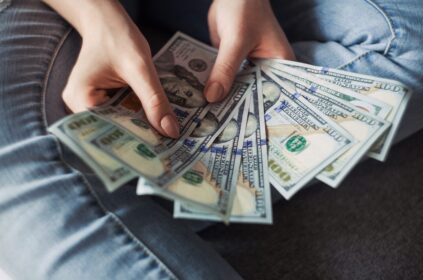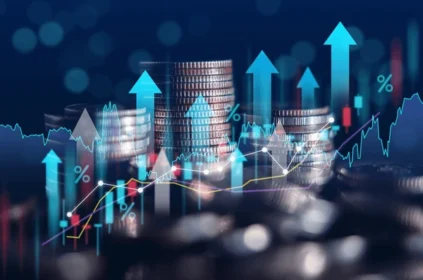Money slang among millennials represents just a small part of how people have talked about currency through history. The term “greenbacks” dates back to the Civil War, while Gen Z now uses phrases like “secure the bag”. Our financial vocabulary keeps evolving, yet some slang terms have stuck around for centuries. The word “bucks” shows this perfectly – it started in the 1700s when people used buckskin as currency.
Money slang is different in various English-speaking cultures. Each generation adds their own twist to this rich language tradition. Some classic terms draw inspiration from food, like “bread” and “dough.” Urban dictionaries now overflow with numeric and bill-based dollar slang. This piece covers what millennials really say about money in 2025. It looks at everything from playful millennial money expressions to worldwide variations and common terms for 100 dollars that people use in everyday talk.
Food-Inspired Money Slang Millennials Still Use
Money slang borrowed from food terms has become popular among millennials because it’s relatable and culturally meaningful. These edible expressions are a great way to talk about finances without using formal banking terms.
Bread, dough, and cheddar
Bread remains one of the longest-lasting food-based money terms millennials use. This slang started in the 1930s and refers to how money, like bread, helps us survive. Young people have brought back the phrase “Let’s get this bread!” as their battle cry to earn money.
Dough came before bread as money slang and people have used it since the 1830s. The Oxford Dictionary found an interesting early example from Yale in 1851: “He thinks he will pick his way out of the Society’s embarrassments, provided he can get sufficient dough”. The connection makes sense – dough becomes bread, just like hard work turns into money.
Cheddar rounds out these baked-good terms. People have different theories about where it started, but most say it came from government cheese in welfare packages. The meaning grew from money from benefits to any kind of money. People now say “She’s got serious cheddar” to show someone has lots of money or income.
Cake, bacon, and lettuce
Millennials love using meat and produce terms for money too. Bacon shows up in “bring home the bacon,” which has meant earning money since the early 1900s. The phrase goes back to 12th century England, where a man who could “bring home the bacon” hadn’t fought with his wife for a year and a day. His neighbors respected him for being patient and having self-control.
Lettuce became money slang around 1929 because dollar bills are green. Millennials still use this veggie term: “She earned a lot of lettuce after negotiating a contract with her new client”. Americans have used this word for money since the early 1900s.
Cake means wealth or big money, linking to the idea of having your cake and eating it too – you’re rich but keep getting richer.
Cabbage, celery, and salad
American money’s green color sparked many vegetable-based slang terms millennials still use today. Cabbage joined money slang around 1942 and people still say things like “spent a lot of cabbage”. Some think the Mafia helped spread this term because crime groups used food words as code for money.
Celery follows the same green-dollar pattern. Rapper Jeezy made this term famous in his 2009 hit “Put On” with Kanye West when he rapped about a “pocket full of celery”. While not as common as other food terms, millennials still know what it means.
Salad includes all these green veggie money terms. Since lettuce, cabbage, and celery mean money, “salad” means having lots of cash – like mixing all these “green” currencies together. The term cleverly combines multiple food-based money references to show financial abundance.
These terms show how creative millennials are at keeping old slang alive while making new expressions that match their unique money experiences in today’s digital world.
Pop Culture and Rap-Inspired Slang Terms
Hip-hop and rap culture have filled money vocabulary with expressions that now rule millennial financial conversations. These terms have grown beyond music to become everyday language, showing how pop culture shapes the way we talk about wealth and success.
Benjamins and Franklins
Benjamins means $100 bills with Benjamin Franklin’s portrait, which has been on this bill since 1914. The term blew up after Puff Daddy’s 1997 hit “It’s All About the Benjamins” and became a symbol of living large and financial status. People don’t call $20 bills “Jacksons” or $50 bills “Grants” nearly as much.
Franklins is another way to talk about the same $100 note. Franklin wasn’t even president like most faces on U.S. currency, but his image stands for wealth in urban slang. Rappers feel comfortable using his first name, which makes these slang terms feel more personal than stuffy financial talk.
C.R.E.A.M. and dollar dollar bill y’all
C.R.E.A.M. (“Cash Rules Everything Around Me”) might be the most powerful money acronym in hip-hop culture. Wu-Tang Clan dropped this term in their 1994 single. Method Man’s friend Raider Ruckus came up with “cream” as money slang while locked up, and Method Man turned it into the famous acronym. The song hit #60 on charts and helped push Wu-Tang’s first album to multi-platinum status.
“Dollar dollar bill y’all” comes straight from the song’s unforgettable chorus: “Cash rules everything around me, C.R.E.A.M., get the money, dollar, dollar bill y’all.” The track is pure hip-hop gold – Rolling Stone ranked it #11 on The 50 Greatest Hip-Hop Songs of All Time, and Time magazine put it in their All-Time 100 Greatest Songs in 2011.
Guap, racks, and bands
Guap might come from Spanish “guapo” (handsome) or “guapa” (pretty) and means serious money. Some say it started in Harlem as slang for a “handsome sum” of money, or as short for “George Washington On Paper.” Nelly used it in his 2004 “Grand Hang Out,” but Big Sean’s 2012 single “Guap” made it mainstream.
Racks stands for thousands of dollars, usually cash. YC’s 2011 track “Racks” with Future made it huge with that “racks on racks on racks” hook. You’ll hear it from Migos to Cardi B when they rap about shopping sprees and stacking wealth.
Bands means stacks of cash held by rubber bands. T.I.’s “Rubber Band Man” brought it up first, but Juicy J’s “Bandz a Make Her Dance” made it huge. Unlike digital money, bands are cash you can count and show off.
Secure the bag and get the bag
Secure the bag started in hip-hop as a way to say “lock down that money opportunity.” The phrase got bigger when Andrew Yang talked about it during his 2020 presidential run to explain his universal basic income plan. Young professionals love this phrase. They’ll say stuff like “She got that promotion; she’s really out here securing the bag!”
Get the bag works the same way as both noun and verb. Lil Uzi Vert puts it straight: “I was on the road, yeah, securing that bag.” This phrase isn’t just about money – it’s about making smart moves. Someone who “gets the bag” played their cards right and cashed in on their chance.
Numeric and Bill-Based Slang for Dollars
Money slang in millennial financial vocabulary goes beyond food and pop culture terms. Numeric and bill-based expressions represent some of the oldest terms that millennials use. These terms come with specific math references that tell you exactly how much money they mean.
C-note and K
A C-note is a classic way to say “$100 bill.” The name comes from the Roman numeral “C” for 100 printed on early $100 bills between 1869 and 1914. The term really took off in the 1920s and 1930s, especially in gangster movies. While Abraham Lincoln’s face appeared on the 1878 and 1880 versions, you’ll now see Benjamin Franklin on these bills.
K means something much bigger. People use this letter as short for “thousand” in business and finance. The letter comes from the Greek prefix “kilo-,” which means one thousand of anything. So when someone talks about “50K,” they mean $50,000.
Grand, G, and stack
Grand showed up in the early 1900s as a way to say $1,000. The story goes that mob members created this term because $1,000 was such a huge amount back then that they needed a code word. Millennials still love using this term today.
G works as a shorter version of “grand” and also means $1,000. Having “five G in the bank” gives you something to celebrate—just don’t mix it up with “G” meaning “gangster”.
Stack follows the same thousand-dollar logic. Sometimes “a stack” means $10,000 instead. The term paints a picture of tall piles of cash that rich people might have.
Slang for 100 dollars and more
People have many other names for the $100 bill besides C-note. Benjamin or Benjamins come from Benjamin Franklin’s picture on the front. You might also hear Bens, Franklins, or Big blue because of the bill’s color.
Moving up to bigger numbers, rock means one million dollars. The $100 bill has become so popular that about two-thirds of them live outside the U.S. By 2022, around 18.5 billion were out there, worth about $1.84 trillion.
The number of C-notes has doubled since the 2007-2008 financial crisis. This might show that more people don’t trust banks and prefer keeping their money in cash.
Funny and Obscure Millennial Slang for Money
The digital world has preserved some of the strangest millennial slang terms for money. These expressions come from unexpected historical sources and tell fascinating stories about our past.
Clams, bones, and smackers
Clams stands out as one of the oddest terms millennials use for money. The name doesn’t quite fit its history. Many cultures including Native Americans, peoples of West and Central Africa, India, and China used shells as currency. But here’s the twist – they rarely used actual clam shells. Specific snail species were the preferred choice for monetary exchange.
Bones has stuck around as slang for dollars since 1889. Nobody really knows why people started calling dollars “bones,” and this mystery still puzzles language experts today [40, 45].
Smackers popped up as dollar slang in the 1920s. People think it might come from the sound of slapping dollar bills into someone’s palm during payments. The 1940s brought some fun variations – “smackeroos,” “smackarolas,” and “smackeroonyos”.
Wampum, spondulix, and simoleons
Wampum comes from “wampumpeag,” a Native American word. Native Americans first used polished shells as jewelry and trade items, and the term later became general slang for money.
Spondulix shows up as a creative 19th-century money term. People spelled it many ways: spondulicks, spondoolicks, spondulacks, spondulics, and spondoolics. The word first appeared as money slang in the late 19th century United States. It might come from the Greek “spondylos,” meaning a shell used as currency, or from “spondylo-” meaning “spine” or “vertebra”.
Simoleons goes back to the early 1800s. Some people think it combines three words: “sixpence,” “Napoleon” (who named a French coin after himself), and the American dollar. By the 1880s, American gangsters had made the term their own.
Fanum tax and Monopoly money
Fanum tax just joined the money slang family. The name comes from Twitch and YouTube star Roberto Pena, known online as Fanum. This term doesn’t mean real money – it describes the unwritten rule that friends will want some of your food when you eat around them. Fanum explained in a 2023 GQ interview that it simply means “feed your friend” and shouldn’t bother anyone.
Monopoly money describes tiny amounts or worthless cash. The term playfully refers to the colorful fake bills from the famous board game and helps people joke about small sums.
UK and Global Urban Slang for Money
Money slang shows amazing variety as you travel from one country to another. Each region’s unique terms tell stories about their culture, history and way of speaking. Young people everywhere have created their own creative ways to talk about cash.
Quid, dosh, and fiver
The British word quid has been slang for the pound sterling in the UK, Australia, and New Zealand since the 1600s. Its roots might trace back to the Latin word “quid” used in phrases like “quid pro quo.” Here’s something interesting – “quid” doesn’t have a plural form. People say “five quid,” but never “five quids.”
Dosh, another British money term from the 1950s, has mysterious origins. The word has stuck around and become a regular part of UK money talk: “He went and spent all his dosh on a new car!”
Fiver and tenner mean £5 and £10 notes. These nicknames are as old as the bills themselves. Americans have picked up these terms too, using them for their own $5 and $10 bills.
Lobster, pineapple, and dollarydoos
Australian money nicknames often come from their colorful plastic bills. People call the red twenty-dollar note a lobster or redback (named after the deadly Australian spider). The yellow fifty-dollar note gets the nickname pineapple. Aussies have this funny habit – they “always apologize for using one.”
Dollarydoos is a newer slang term that came from a 1995 episode of The Simpsons called “Bart vs. Australia.” Someone started a petition in 2015 to make “Dollarydoos” the official name of Australian money. It got 50,000 signatures in five days. The person behind it claimed this would boost the economy because people worldwide would want Australian money just for The Simpsons connection.
Dinero, plata, and lana
Spanish speakers use dinero as their main formal word for money. But across Latin America, plata (which means “silver”) serves as the casual go-to term that everyone knows.
Lana (meaning wool) is popular slang in Mexico, Panama, and Peru. This nickname probably started during America’s wool boom, when having wool meant you had money. You might hear someone say: “No me voy de viaje porque no tengo lana, mano” (“I don’t go on vacations ’cause I have no money, bro”).
These different terms show how young people’s money slang comes from both old currency traditions and modern pop culture that keeps changing how we talk about money.
Summing all up
Money slang means much more than just creative alternatives to financial terms. These expressions have evolved into cultural touchstones throughout history and reflect our society’s values and generational identity. Traditional terms like “bucks” from the 18th century and modern phrases like “secure the bag” show how our financial vocabulary grows while keeping its linguistic roots intact.
Terms inspired by food have shown remarkable staying power as metaphors. This makes sense since both money and food are basic human necessities. Hip-hop culture has without doubt shaped modern financial language by creating expressions that exceed the music world to become everyday communication tools. Number-based and bill-related slang brings precision to colorful language, while lesser-known terms connect us to fascinating historical stories.
Money slang adapts differently in cultures worldwide. British “quid,” Australian “pineapples,” and Spanish “lana” each tell their own stories about how regions relate to currency. These language differences show money as both a universal concept and a culture-specific experience.
Some terms have lasted for centuries, which suggests money slang does more than just add creative flair to language. These expressions create quick ways to communicate, build group identity, and sometimes offer coded language to discuss sensitive money matters. Today’s millennials have become skilled at keeping traditional slang alive while creating new terms that capture digital-age money experiences.
Money slang ended up showing our complex bond with currency—practical, emotional, and cultural all at once. Our vocabulary for discussing wealth, success, and economic goals will keep changing as financial worlds revolutionize. This array of expressions shows how language lives and breathes, always adapting to society’s changes while keeping ties to our shared financial past.
Here are some FAQs about the millennial slang for money:
What is current slang for money?
Millennial slang for money includes terms like “guap,” “cheddar,” and “bread” that remain popular today. The millennial slang for money urban dictionary shows these terms originated from hip-hop culture before becoming mainstream. Funny millennial slang for money like “dough” or “bacon” still get used, though Gen Z has added their own twists to money terminology.
What is a cool way to say money?
Some of the coolest millennial slang for money includes “bandz” (for stacks of cash) and “racks” (thousands of dollars). Funny millennial slang for money like “cheese” or “cake” adds humor to financial conversations. The millennial slang for money urban dictionary lists dozens of creative alternatives that make talking about finances more colorful.
What is the UK slang for money?
British equivalents to millennial slang for money include “quid” (pounds), “dosh,” and “wedge.” While different from American millennial slang for money urban terms, these UK versions serve the same purpose. Funny millennial slang for money crosses borders too, with terms like “bread” being understood in both countries.
What do people call money in slang?
People use countless slang terms for money, with millennial slang for money urban dictionary entries numbering in the hundreds. Popular millennial slang for money includes “scrilla,” “dead presidents” (referencing bills), and “moolah.” Funny millennial slang for money terms like “cheddar” or “cheddah” keep financial talk lighthearted.
How do you say money in Gen Z?
Gen Z has built upon millennial slang for money with terms like “skrilla” and “gwop” gaining popularity. While they share some millennial slang for money urban terms like “bands,” Gen Z favors abbreviated versions like “bands” becoming “bns.” The evolution from funny millennial slang for money shows how language constantly changes.
Is Slay still cool?
While “slay” originated before Gen Z, it remains popular alongside millennial slang for money terms. The word has evolved from millennial slang for money urban usage to broader compliments about success. Like funny millennial slang for money, “slay” maintains cultural relevance through memes and social media.
What is Gen Alpha slang for money?
Gen Alpha is developing their own terms, though they borrow from millennial slang for money like “coins” for general cash. Early observations suggest they’re shortening millennial slang for money urban terms further (like “bands” to “bns”). While not as established as funny millennial slang for money, their language continues evolving with digital culture.
















[…] twice weekly and pay up to $75 per session. Delivery work pays around $17 per hour, making it easy to earn an extra $50 in a […]